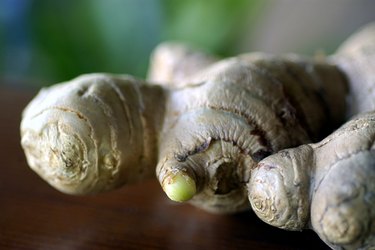
If you have high cholesterol, a plant rhizome that's commonly used as a cooking spice may help lower it. Ginger has been used as a remedy for headaches, nausea, vomiting, motion sickness and arthritis. Ginger may reduce inflammation, and this may be why some researchers think it's beneficial for your heart and lowering high cholesterol. More studies are needed to prove this, however.
Limiting Those Lipids
Video of the Day
Researchers of a study published in the journal "Food and Function" in 2013 state that the mechanism by which ginger may lower cholesterol is well understood by scientists and other researchers. They explain that ginger activates an enzyme that increases your body's use of cholesterol and lowers it. Several studies show that ginger can lower experimentally induced high cholesterol in animals, but more studies on ginger's effect on humans with high cholesterol are needed before the substance can be touted as a treatment for high cholesterol.
Video of the Day
Out With the Bad, In With the Good
In a study published in "Saudi Medical Journal" in 2008, researchers split individuals with high cholesterol into two groups and gave one group 3 grams of ginger daily split into three 1-gram capsules. They gave the other group lactose capsules instead. At the end of 45 days, both groups had lower total and "bad" cholesterol, along with higher "good" cholesterol. The ginger group experienced a significantly larger change, however, indicating that ginger may lower cholesterol bad cholesterol and increase good cholesterol.
Using Ginger
Ginger is available in many forms, including fresh or dried ginger root and ginger oil, extract and capsules. Make ginger tea by boiling sliced or pummeled fresh ginger root for 10 to 20 minutes, then strain the ginger and drink the water as tea. Use ginger as spice in recipes such as bakery items, soups, poultry and fish. Select fresh ginger in the produce department that is firm with a spicy scent and features smooth skin without cracks.
How Much Is Safe
Cooking with ginger is safe for most people, but check with your doctor, especially if you have a health condition or if you want to take a ginger supplement. If you do not have high cholesterol, you probably do not need to start taking ginger daily to lower your cholesterol. Ginger can interfere with some medications or cause adverse effects if you take too much. When you decide to take a supplement, the University of Maryland Medical Center recommends that you do not consume more than 4 grams of ginger, or 2 teaspoons powdered. Pregnant women should not consume more than 1 gram -- 1/2 teaspoon powdered -- of ginger per day. Read labels if you are taking a ginger supplement, such as a capsule form of ginger.
- Food and Function: Dietary Spices as Beneficial Modulators of Lipid Profile in Conditions of Metobolic Disorders and Diseases
- University of Maryland Medical Center: Ginger
- Saudi Medical Journal: Investigation of the Effect of Ginger on the Lipid Levels. A Double Blind Controlled Clinical Trial.
- Fruits and Veggies More Matters: Ginger Root
Is this an emergency? If you are experiencing serious medical symptoms, please see the National Library of Medicine’s list of signs you need emergency medical attention or call 911.